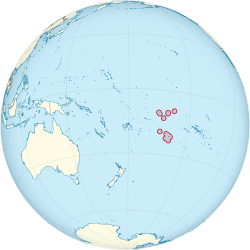 Location of the Cook Islands (red) | |
| Medicinal | Legal |
|---|---|
| Recreational | Illegal |
| Part of a series on |
| Cannabis |
|---|
 |
Cannabis in the Cook Islands is illegal for recreational purposes. A non-binding referendum to legalise it for medicinal purposes passed with 62% in 2022, [1] and medicinal cannabis became legal on 2 July 2024. [2]
In 2010, Cook Islands Police and New Zealand Police launched Operation Eagle, arresting the son of a prominent local politician, and two former police officers. [3]